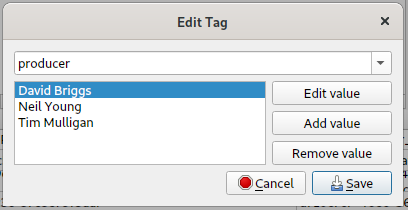This is a repost of my attempt at trying to understand and hopefully fix an issue I am encountering with how my media player (MediaMonkey) and Picard are constantly disagreeing on the interpretation of the semi-colon used to separate multiple artists in the Artist field. I’m leaning toward the source of the problem being MediaMonkey since every other views the field just fine after Picard updates the tags and it all goes south after MediaMonkey manipulates it again. Maybe someone here recognizes what I’m doing wrong.
================
I like to use the semicolon for multiple-value fields, as set under Library>Appearance.
Example track: Johnny Cash and June Carter on Johnny Cash’s album “Orange Blossom Special.” After organizing and tagging in MMW (MediaMonkey), the tags appear as follows
[list]Title: It Ain’t Me Babe
[]Album Artist: Johnny Cash
[]Artists: Johnny Cash; June Carter
[]Album: Orange Blossom Special
[]Genre: Country; Oldies[/list]
I select all and choose properties to bulk edit a field. It doesn’t appear to matter which field, but let’s say select comments to zero the value out, or manipulate the album art to apply to all.
Now within MMW and MMA the above tags remain unchanged.
However, seemingly anything else used to view the tags (Picard, Windows Explorer, Jaikoz for example) displays the tags in the following manner
[list]Title: It Ain’t Me Babe
[]Album Artist: Johnny Cash
[]Artists: Johnny Cash/June Carter
[]Album: Orange Blossom Special
[]Genre: Country; Oldies[/list]
I load the album into Picard for supplemental tagging, and it shows
Artist New Value: Johnny Cash; June Carter
Artist Original Value: Johnny Cash/June Carter
Apply changes. Subsequent tag viewing in anything but MMW has the semicolon shown as the separator. As soon as I manipulate the track in MMW the Artists field reverts back to forward-slash.
I do have auto-organized enabled. While that should not affect tags, I don’t even use the Artist field.
G:\Audio\Music\$If($Left($RemovePrefix(<Album Artist>),1) >= 0,#,$Left($RemovePrefix(<Album Artist>),1))\$Left(<Album Artist>,50)\$Left(<Album>,50)\<Track#:2> - $If(<Album Artist>=Various Artists,$Left(<Artist>,50),$Left(<Album Artist>,50)) - $Left(<Title>,50)Relevant MMW settings:
Store MP3 properties using: ID3v2
ID3v2 text encoding: ASCII + UTF-16 (when needed)
In Picard:
Convert Unicode punctuation characters to ASCII is enabled
Tag Compatibility: ID3v2 version 2.4 (Same results with v2.3 and UTF-16)
ID3v2 Text Encoding: UTF-16 (Same results with UTF-8)
Beyond the annoyance that MMW and other products cannot agree on how the separator is handled in the the Artist field, why is it only affecting Artist and not Genre?
How do I get this to be handled uniformly?

